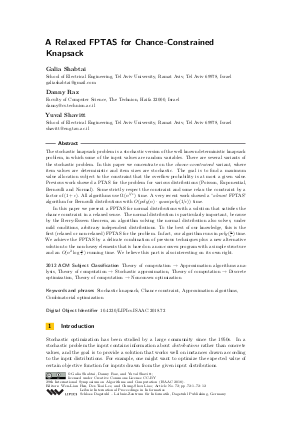A Relaxed FPTAS for Chance-Constrained Knapsack
Authors Galia Shabtai, Danny Raz, Yuval Shavitt
-
Part of:
Volume:
29th International Symposium on Algorithms and Computation (ISAAC 2018)
Part of: Series: Leibniz International Proceedings in Informatics (LIPIcs)
Part of: Conference: International Symposium on Algorithms and Computation (ISAAC) - License:
 Creative Commons Attribution 3.0 Unported license
Creative Commons Attribution 3.0 Unported license
- Publication Date: 2018-12-06
File

PDF
LIPIcs.ISAAC.2018.72.pdf
- Filesize: 0.51 MB
- 12 pages
Document Identifiers
Subject Classification
ACM Subject Classification
- Theory of computation → Approximation algorithms analysis
- Theory of computation → Stochastic approximation
- Theory of computation → Discrete optimization
- Theory of computation → Nonconvex optimization
Keywords
- Stochastic knapsack
- Chance constraint
- Approximation algorithms
- Combinatorial optimization
Metrics
- Access Statistics
-
Total Accesses (updated on a weekly basis)
0PDF Downloads0Metadata Views
Abstract
The stochastic knapsack problem is a stochastic version of the well known deterministic knapsack problem, in which some of the input values are random variables. There are several variants of the stochastic problem. In this paper we concentrate on the chance-constrained variant, where item values are deterministic and item sizes are stochastic. The goal is to find a maximum value allocation subject to the constraint that the overflow probability is at most a given value. Previous work showed a PTAS for the problem for various distributions (Poisson, Exponential, Bernoulli and Normal). Some strictly respect the constraint and some relax the constraint by a factor of (1+epsilon). All algorithms use Omega(n^{1/epsilon}) time. A very recent work showed a "almost FPTAS" algorithm for Bernoulli distributions with O(poly(n) * quasipoly(1/epsilon)) time.
In this paper we present a FPTAS for normal distributions with a solution that satisfies the chance constraint in a relaxed sense. The normal distribution is particularly important, because by the Berry-Esseen theorem, an algorithm solving the normal distribution also solves, under mild conditions, arbitrary independent distributions. To the best of our knowledge, this is the first (relaxed or non-relaxed) FPTAS for the problem. In fact, our algorithm runs in poly(n/epsilon) time. We achieve the FPTAS by a delicate combination of previous techniques plus a new alternative solution to the non-heavy elements that is based on a non-convex program with a simple structure and an O(n^2 log {n/epsilon}) running time. We believe this part is also interesting on its own right.
Cite As Get BibTex
Galia Shabtai, Danny Raz, and Yuval Shavitt. A Relaxed FPTAS for Chance-Constrained Knapsack. In 29th International Symposium on Algorithms and Computation (ISAAC 2018). Leibniz International Proceedings in Informatics (LIPIcs), Volume 123, pp. 72:1-72:12, Schloss Dagstuhl – Leibniz-Zentrum für Informatik (2018)
https://doi.org/10.4230/LIPIcs.ISAAC.2018.72
BibTex
@InProceedings{shabtai_et_al:LIPIcs.ISAAC.2018.72,
author = {Shabtai, Galia and Raz, Danny and Shavitt, Yuval},
title = {{A Relaxed FPTAS for Chance-Constrained Knapsack}},
booktitle = {29th International Symposium on Algorithms and Computation (ISAAC 2018)},
pages = {72:1--72:12},
series = {Leibniz International Proceedings in Informatics (LIPIcs)},
ISBN = {978-3-95977-094-1},
ISSN = {1868-8969},
year = {2018},
volume = {123},
editor = {Hsu, Wen-Lian and Lee, Der-Tsai and Liao, Chung-Shou},
publisher = {Schloss Dagstuhl -- Leibniz-Zentrum f{\"u}r Informatik},
address = {Dagstuhl, Germany},
URL = {https://drops.dagstuhl.de/entities/document/10.4230/LIPIcs.ISAAC.2018.72},
URN = {urn:nbn:de:0030-drops-100201},
doi = {10.4230/LIPIcs.ISAAC.2018.72},
annote = {Keywords: Stochastic knapsack, Chance constraint, Approximation algorithms, Combinatorial optimization}
}
Author Details
- School of Electrical Engineering, Tel Aviv University, Ramat Aviv, Tel Aviv 69978, Israel
References
-
Anand Bhalgat, Ashish Goel, and Sanjeev Khanna. Improved approximation results for stochastic knapsack problems. In Proceedings of the twenty-second annual ACM-SIAM symposium on Discrete Algorithms, pages 1647-1665, 2011.

-
Daniel Blado, Weihong Hu, and Alejandro Toriello. Semi-infinite relaxations for the dynamic knapsack problem with stochastic item sizes. SIAM Journal on Optimization, 26(3):1625-1648, 2016.

-
Anindya De. Boolean function analysis meets stochastic optimization: An approximation scheme for stochastic knapsack. In Proceedings of the Twenty-Ninth Annual ACM-SIAM Symposium on Discrete Algorithms, pages 1286-1305. SIAM, 2018.

-
Ashish Goel and Piotr Indyk. Stochastic load balancing and related problems. In IEEE FOCS, pages 579-586, 1999.

-
Vineet Goyal and R Ravi. A PTAS for the chance-constrained knapsack problem with random item sizes. Operations Research Letters, 38:162-164, 2010.

-
Jon Kleinberg, Yuval Rabani, and Éva Tardos. Allocating bandwidth for bursty connections. SIAM Journal on Computing, 30(1):191-217, 2000.

-
Jian Li and Wen Yuan. Stochastic combinatorial optimization via poisson approximation. In Proceedings of the forty-fifth annual ACM symposium on Theory of computing, pages 971-980. ACM, 2013.

-
Evdokia Nikolova. Approximation algorithms for offline risk-averse combinatorial optimization. Approximation, Randomization, and Combinatorial Optimization. Algorithms and Techniques, pages 338-351, 2010.

-
Galia Shabtai, Danny Raz, and Yuval Shavitt. Risk aware stochastic placement of cloud services: the case of two data centers. In International Workshop on Algorithmic Aspects of Cloud Computing, pages 59-88. Springer, 2017.

-
Galia Shabtai, Danny Raz, and Yuval Shavitt. A relaxed FPTAS for Chance-Constrained Knapsack - Technical Report, 2018. To appear.

